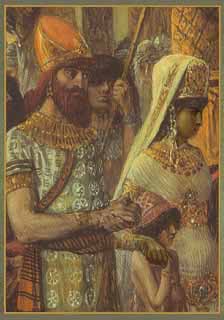
This version of the story of Solomon and the Queen of Sheba dwells mainly on the importance of wisdom. The importance that Ethiopia has is eventually expressed near the end of the story. The light that moved from Israel to Ethiopia could signify a multitude of things. Israel has always been considered the promise land and the Israelites were God's chosen people. The light maintained its position over Israel for a time to represent that idea, however, the light then moved to Ethiopia and stayed there, shining brighter "for it willed to dwell there." Ethiopia, in this reading, appears to be the new chosen place, the new promise land for the followers of God.
This idea is suprising to me because I had never even considered Ethiopia to be a strong religious power. I was unaware that it was a Christian state. This story counters that ignorance quite strongly, the vision that Solomon received was, to him, apparently directly from God. The sun followed the light of God, or was perhaps instructed by God to no longer shine on Israel. The story shows that the Israelites hated the Sun for ignoring them and this hatred permanently ruined their relationship with the Sun, which is a representation for the light of God. The Sun ends up illuminating the whole world, besides Israel. This does not really make any sense.
The light of God, without warning, decides that Ethiopia is more worthy than Israel and leaves that state forever. It does not explain what Israel nor what Ethiopia did to deserve their respective kinds of treatment. There had to be a distinct reason for God to completely and utterly abandon his chosen people. He basically indicated that his intention was to leave Israel forever. Does God mean the land, the people, their way of life, or a combination of all of them is upsetting him enough to move his light and love to Ethiopia? The fact that it was a dream and Solomon was more concerned with how beautiful the Queen of Sheba was in some ways undermines this apparent warning. Or is it a warning? If the Israelites change something will they not be banished forever into darkness? Or is this event inevitable? There was no timeline given for this light exodus either.







